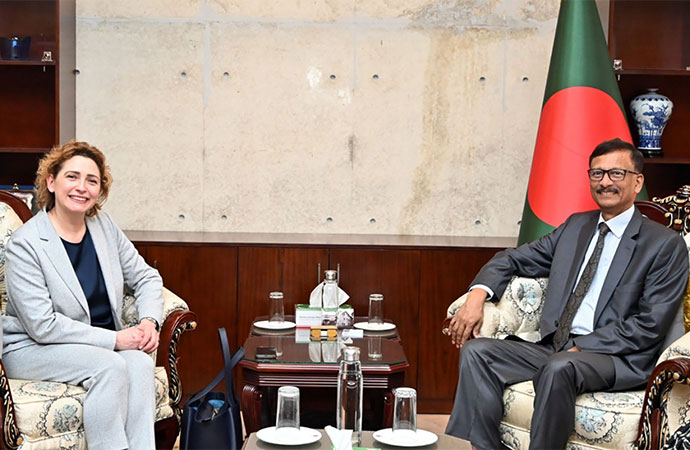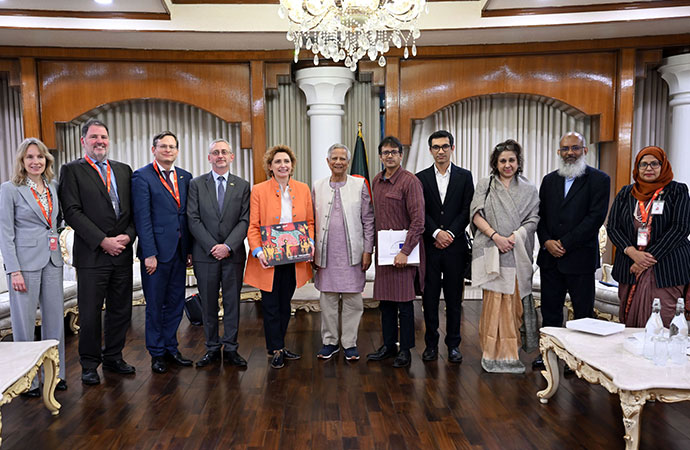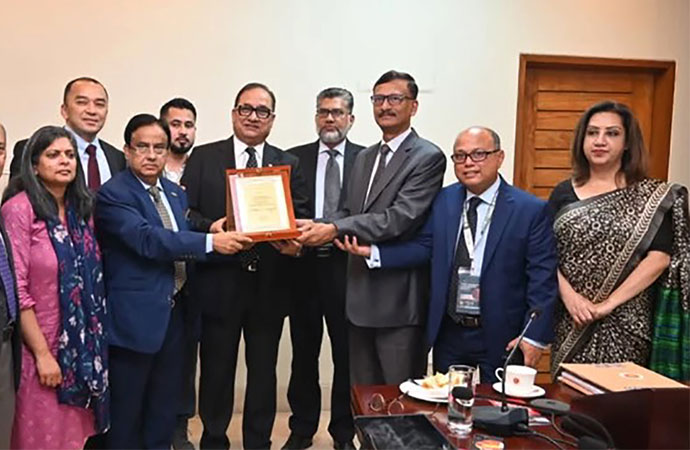Politics

European Investment Bank (EIB) Vice-President Nicola Beer holds a meeting with Foreign Affairs Adviser Md Touhid Hossain at his office at the Ministry of Foreign Affairs on 7 January 2025. Photo: Courtesy
It's up to Bangladeshi citizens, bodies to decide on moment of elections, she says
European Investment Bank (EIB) Vice-President Nicola Beer on Tuesday said they find the current situation in Bangladesh "stable" for their investment in priority sectors.
"The current situation I see... It's stable for investment. So, we go on with what we already decided together. So, this was the reason why I was speaking about further signatures during this year's time," she told reporters while responding to a question at the Ministry of Foreign Affairs after her first meeting with Foreign Affairs Adviser Md Touhid Hossain at his office.
But of course, Beer said, it is up to the Bangladeshi citizens and bodies to decide on the moment of elections and of the power then in Parliament afterwards.
The EIB Vice President said she can only express from the side of the European investment Bank group that they are "backing" this interim government and they are looking together with the different ministries and sectors, which investments they now can also speed up.
They also talked about the priorities of investments in Bangladesh to deliver. "I'm quite optimistic that we will see through the signatures during this year to come on important projects, especially in the sector of water and sanitation," she added.
"I think we are quite near when it comes up for the programme of the interim government to reform and lead it to elections, quite soon," Beer said.
She said she is really happy now to be here in Dhaka to hear firsthand from the different ministries, but also from economy leaders and citizens groups about the challenges and about their own plans for the future of the country.
"I hope we can deliver together, especially with the support of the European Union. So I'm very happy that the ambassador is with us who is very well connected here in the country and gives us valuable insights," Beer said.
"I only can assure you that the European Union as a whole is standing behind this interim government together with the Bangladeshi people, to serve the Bangladeshi citizens for the future to come," she added.
Responding to a question from the UNB correspondent, Beer said energy is a very important part of it. "We have a framework loan, we want to bring it really down now also in the project and this is something we will look further and try to speed up."
In today's meeting they discussed international relations, how they can place this country also in the region as a strong nation on an equal footing.
"We reaffirm the support of the European Union and also of its bank as European Investment Bank. And now we'll see the different projects and maybe also new proposals with the other ministries and sectors. So maybe you ask me in two days' time," Beer said.
She began her three-day visit on Tuesday to review existing partnerships, discuss various issues and explore expanded investment cooperation with the interim government.
Ambassador of the European Union to Bangladesh Michael Miller, among others, accompanied her during the meeting with Adviser Hossain.
"A number of meetings have been lined up, including a meeting with Chief Adviser Prof Muhammad Yunus," a senior official told UNB on Monday.
Vice-President Beer, during her stay in Dhaka, will also hold meetings with Finance and Planning Adviser Dr Salehuddin Ahmed, Power, Energy and Mineral Resources; Railways Adviser Muhammad Fouzul Kabir Khan, Environment, Forest and Climate Change, Water resources Adviser Syeda Rizwana Hasan, Local Government, Rural Development and Co-operatives Adviser Asif Mahmud Shojib Bhuyain and Bangladesh Bank Governor Ahsan H Mansur to discuss wide range of issues, officials at the relevant ministers said while speaking to the UNB correspondent.
She will also have a breakfast meeting with the representatives of the KfW, AfD, ADB, IMF, WB, IFC and JICA.
The Vice President will have an interaction over dinner with the European Union Chamber of Commerce in Bangladesh (EuroCham).
She is likely to visit Ghandharbpur Water Treatment Plant on Thursday before wrapping up her visit.
The EIB, owned by the 27 EU member states, is the world's largest multilateral financial institution and serves as the European Union's investment bank.
Vice-President Beer oversees policy priorities, critical raw materials, EU Multiannual Financial Framework (MFF) and financing operations in South, Southeast and East Asia.
While climate action is a big part of EIB activities, it also focuses on the environment, development, innovation and skills, small and medium-sized businesses (SMEs), infrastructure and cohesion.
Prof Yunus recently urged the European Union (EU) to extend support to Bangladesh to transform its energy sector.
"We look forward to your cooperation on that...we also talked to other countries to provide us support for transformation of our energy sector," he said during an interactive session with the diplomats of European countries, stationed in Dhaka and New Delhi last month.
Chief Adviser Prof Yunus said the environment is, of course, a top priority for them. Bangladesh is a victim of environmental degradation that is taking place, Prof Yunus said, adding, "In one area, I get very interested - renewable energy".
The EIB finances and invests both through equity and debt solutions companies and projects that achieve the policy aims of the European Union through loans, equity and guarantees.
Since its establishment in 1958, the EIB has invested over a trillion euros in projects in Europe and countries worldwide.

























Leave a Comment
Recent Posts
Pedaling Through the Mangroves ...
The journey from the bustling streets of Barishal to the serene, emera ...
Why the Interim Government mus ...
Two weeks out from what is expected to be a red letter day in the figh ...
Doesn’t matter who thinks what about Bangladesh deci ..
The Other Lenin
US President Donald Trump said his administration
Govt moves to merge BIDA, BEZA, BEPZA, MIDA